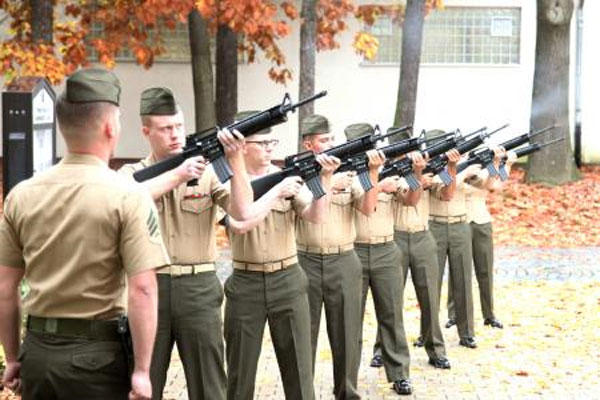STUTTGART, Germany -- "The force of the explosion initially lifted the entire four-story structure, shearing the bases of the concrete support columns, each measuring fifteen feet in circumference and reinforced by numerous one-and-three-quarter-inch steel rods. The airborne building then fell in upon itself."
This was the scene as described in Eric Hammel's The Root: The Marines in Beirut, August 1982-February 1984, the authoritative source on the 1983 Beirut bombing. This scene claimed the life of 220 Marines, 18 Sailors and 3 soldiers, most killed as they slept in their racks. Of those who witnessed those nightmare events, two remain on active duty today.
Non-commissioned officers (NCO's) within Marine Corps Forces Europe and Africa organized a Beirut bombing memorial Oct. 23 which remembered those who lost their lives or were impacted by the sad day in America's history 30 years ago. Most of the organizers were not alive when it happened yet they felt a bond beyond the uniform which made it extra meaningful.
According to Sgt. Bryson M. Jones, one of the event organizers and Washington Court House, Ohio native, the NCOs thought it was important to take a moment, remind their fellow Marines of "why we are here, the Marine to the left and the right of us and honoring those that came before us."
Although thirty years has passed since that fateful day, the Marines of MARFOREUR and MARFORAF, gathering to honor the memory of those Americans, have much in common with the Marines in Beirut. As the Marines of today witnessed the event played on the overhead projector, they were reminded that history is not just an abstract class in high school or a channel on television.
The Marines in Beirut were on a peace keeping mission to restore order to Lebanon during a time of religious fighting between Christians and Muslims. The driver of the truck, an extremist from the terrorist organization Islamic Jihad, was on a suicide mission, driving a truck with as much as 21,000 pounds of explosives. The reported reason for the attack was the American presence in the country during the Lebanese Civil War.
This story is an all too familiar story to the Marines at the memorial, after 12 years of the Global War on Terrorism. They know the high cost of fighting an enemy that hates you for simply having a presence in their country. These Marines are living the lessons learned on that fateful morning as they support the deployment of Marines working with countries across Africa and Europe. The goal is to share these lessons in order to bring and maintain stability to an area that has historically been unstable, just as it was 30 years ago.
The NCOs were keeping with a tradition as old as the Marine Corps itself, one that has been taught since the early days of basic training -- history must be remembered, honored and passed on. Memories such as the Halls of Montezuma to the events at Iwo Jima are still talked about today. Memories of more recent events such as the Beirut bombings or the battle of Fallujah must be honored.



























